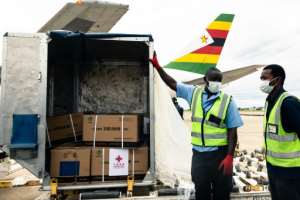
[ad_1]
Zimbabwe’s anti-corruption police last month recovered around 40 boxes of Covid-19 test kits worth thousands of dollars stolen from a public hospital in Bulawayo, the country’s second largest city.
Donated by UNICEF, they had been hidden in a building opposite the central bank of the capital Harare and were intended for the black market.
It was one of the last pandemic-linked transplant cases a year after the coronavirus surfaced in the country.
Zimbabwe registered its first Covid case on March 20 last year and three and a half months later the Minister of Health was sacked for corruption.
He has been accused of improperly awarding a multi-million dollar contract to a foreign-based company to supply personal protective equipment, test kits and medication.
In addition, he was accused of trying to coerce the Treasury into paying for 15,000 coronavirus test kits stored at Harare International Airport. Upon inspection, only 3,700 kits were found.
As the southern African country started rolling out Covid vaccines last month, questions are being raised about the vaccine purchasing process.
The government has set aside 100 million dollars (83 million euros) for vaccines to immunize 10 million of its 14.5 million inhabitants.
“The people I have spoken to are worried about corruption, the looting of public funds,” said Hopewell Chin’ono, an alert reporter whose reporting brought down the health minister.
The song ‘They Plunder’ goes viral
In February, shortly after being released from prison – his third arrest in six months – the investigative journalist released a short reggae track “Demloot” (They Loot) which immediately went viral.
Zimbabwe’s chief epidemiologist Portia Manangazira was recently arrested for allegedly recruiting 28 family members, including her father, as community health workers in a nearly $ 800,000 virus awareness program funded by the African Centers for Disease Control and Prevention (CDC in Africa).
The training exercise, for 800 community health workers, earned her family a monthly stipend of $ 600 for three months, prosecutors said.
The anti-corruption watchdog is investigating a dozen cases linked to the coronavirus program.
“At least 10 cases are … (linked to) corruption in the purchase of PPE and other materials,” Zimbabwe Anti-Corruption Commission spokesperson John Makamure said.
The charges include criminal abuse of power by public officials, fraud and theft, Makamure said, refusing to release details.
Transparency International Zimbabwe told AFP it had received 1,400 complaints related to corruption in healthcare, police and humanitarian aid in the event of a pandemic in 2020.
Health workers complain about insufficient protective equipment, blaming corruption for scarcity.
“The situation is dire,” said Simbarashe Tafirenyika, head of the nurses’ union.
 Workers unload part of a 200,000-dose shipment of the Sinopharm coronavirus vaccine from China. By Jekesai NJIKIZANA (AFP / File)
Workers unload part of a 200,000-dose shipment of the Sinopharm coronavirus vaccine from China. By Jekesai NJIKIZANA (AFP / File) According to official tally, the virus has killed at least 1,500 of the nearly 37,000 diagnosed cases – figures experts consider an understatement.
The peak of the second wave earlier this year revealed the dire state of public hospitals that were already collapsing following a two-decade economic crisis and runaway inflation.
Public hospitals were saturated in January, and private hospitals came under fire for capitalizing on this and charging desperate families exorbitant fees – up to $ 2,500 a week for ventilator use.
Source link